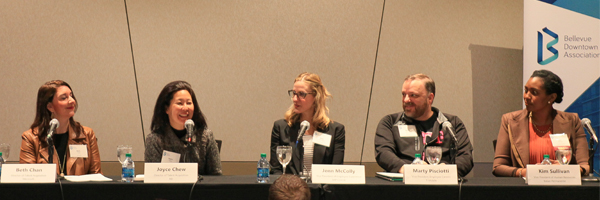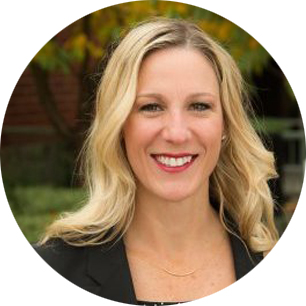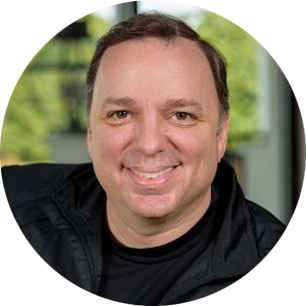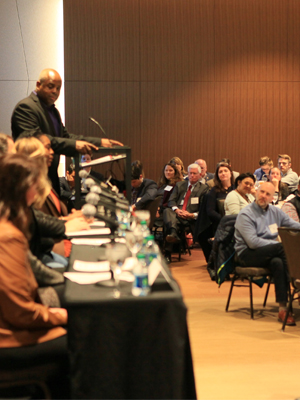Learning from the Best: What it Takes to Attract & Retain Talent
February 28, 2018 - by Emma Sullivan
Category What's Happening
Learning from the Best: What it Takes to Attract & Retain Talent
Emma Sullivan, February 28, 2018
Yesterday morning, we were joined by over 150 people at the Meydenbauer Center for our February BDA Breakfast. For this breakfast, the Bellevue Downtown Association put together a program which would help attendees learn from the best about what it takes to attract and to retain talent. The breakfast included a panel, moderated by James Whitfield, President of Leadership Eastside, featuring BDA member organizations recognized among the 2018 Best Places to Work on glassdoor.com.

Read on for insights from our panelists about what makes their organization's philosophy and methodology for creating a worthwhile workplace. We learned about the creative approaches these companies take to stay competitive, build loyalty and improve the employee experience.
Featured Panel

Beth Chan
Microsoft, Director of Talent Acquisition

Joyce Chew
REI, Director of Talent Acquisition

Jenn McColly
SAP Concur, Vice President of Employee Experience

Marty Pisciotti
T-Mobile, Vice President, Employee Careers

Kim Sullivan
Kaiser Permanente, Vice President of Human Resources
We asked our panel a series of questions about attracting and retaining talent. Below is a quick recap of the questions asked and the responses given by our panelists. (Not every panelist answered every question).
Question 1:
What is talent acquisition? What's the priority, acquisition or retention?
Joyce: "Talent acquisition is a little bit of art, a little bit of science. It's important to look at the labor markets, identify the people you want, and understand what they want - what's important to them. Once you understand that, you have to use the right 'lures' and make sure they understand and relate to your company's brand. If you have the right people, and they buy into your brand, they'll stick around."
Jenn: "Acquisition is about intentionally identifying and understanding business priorities and proactively finding talent rather than when you're in a crunch."
Marty: "Acquisition means finding the right person for the job. If you know what you need, and find the person for that need, retention will also follow."
Kim: "It's also important to think in a non-traditional way about attracting talent. You can't just expect people to come to you - you have to meet them where they are and stand out from the competition."
Question 2:
When considering a new job, everyone weighs the benefits to their status quo. Is it better pay? Work culture or pride in the service or product? What have you observed to be a major motivating factor for employee commitment to your business? What has changed in the game since, say, 10 years ago?
Kim: "Work life balance is huge when it comes to the long game. It's also important to keep in mind that work life balance looks different to every person."
Marty: "Nowadays, looking at workplace culture is incredibly important - especially in the competitive tech industry. Additionally, offering personal development and training is a huge factor in why people choose you and continue to stay on - this was definitely less the case in the past."
Beth: "There are 5 generations in the work force and everyone lives out their lives differently. Offering flexible work schedules is incredibly important - not offering it can be a deal breaker for some employees or applicants."
Jenn: "I agree with offering flex time. Offering flexible schedules shows that leadership trusts its employees. To receive your employees' trust you have to empower them and give it first. This is one of the ways to do that. Increased trust feeds back into engagement and retention."
Question 3:
As an organization, how do you effectively solicit feedback from employees and address evolving needs or concerns?
Jenn: "We started with an annual survey of our people and have moved towards doing this more regularly - sort of a 'living and breathing' model instead of a 'point in time' model. Employee feedback is top of mind and a definite priority for our company leaders. It's also important to get actionable feedback. If you don't make changes after receiving feedback, not only is there no point but it's also demoralizing."
Marty: "At T-Mobile, our approach is that the people who interact directly with the customers are the most important. Everyone else is oriented towards making these people successful. We try and get feedback from these people and work towards meeting their needs. As Jenn said, acting on feedback is vital. Another step we've taken is orienting our employees' personal growth towards our company's success - when we approach it with this mindset, we can better address the needs of our employees but also of the company."
Question 4:
How does your company respond to external influences (such as limited housing options and increased commute times)? What are you doing proactively to tackle these challenges and how are you setting your employees up for success?
Joyce: "Even though there are now 5 generations in this workforce, there's actually a lot of consistency between the 'wants' and 'needs' of each generation. A lot of why our employees come to REI and stay is because we are mission oriented. "Purpose over pay." Figure out what you stand for as a company and find employees who stand for that too. As a company it's important to back up what you say with what you promise. REI's #optoutside campaign is a good example of how we did that."
Beth: "For us, it has been important to shift to a listening model. I look at it as sort of a "learn it all" instead of "know it all" model. It's important to hear what our employees are saying, what they're struggling with, and then try and find the best solutions for them. I'll also agree that it's important to identify what you stand for and make sure your employees feel it in the day-to-day."
 Question 5:
Question 5:
As Downtown Bellevue and our surrounding region continue to attract an increasingly global workforce, what changes has your company made in the last few years to best accommodate the talent you're attracting?"
Marty: "It's important to set the right expectations. We'll bring people in to our office, to the region, so that they know what to expect when they join our company. We also acknowledge that there are many challenges in this region (expensive housing, transportation, etc.). We've started to combat this by offering options to work from home, creating shuttles and more. We also take a look at ourselves and consider 'why is it worth it to our employee to overcome <insert challenge> to continue working for us? How can we help them overcome this?'"
Beth: "Don't assume you know what people need. Ask questions and if you don't have the right answer for them, connect them to the resource they need. Help them find and create a space where they can make and engage in their own community."
Jenn: "We identify critical 'moments that matter' in both their work and personal lives. We also want to make sure we create a space so that their voice is heard."
Question 6:
What advice would you share with a small or medium sized business to attract and retain the best talent they can get?
Beth: "Invest time in thinking about who is interviewing your candidates. Often, interviewers subconsciously prefer candidates who are like themselves - this is not necessarily a good thing as diversity is important to any business. Also consider, what is your interviewer selling? Are they the best representation of your business? Is the job candidate getting the experience you want them to have in the interview?"
Joyce: "Be clear on what differentiates you as an employer. Understand why people come, stay and leave. Develop your message to candidates through the lens of your current employees. Additionally, make sure you're curating your recruitment and messages to each candidate."
Jenn: "Authenticity is key. Intentionally bring in and curate a diverse team. Think about what your team needs - what kind of person should you add to round out your existing team?"
Marty: "Small and medium sized businesses are incredible in that they can offer access to leadership in ways that large companies cannot. Take advantage of this and let your passion be effective."
Kim: "Look at your company's goals and identify behaviors and practices needed to be successful. When recruiting, if possible, look through a talent lens and not a budget lens. Don't hire a $30,000/yr person for a $75,000/yr job."
And one more just for fun...moderator James Whitfield told us a story of his first/worst job working at a suit shop. He in turn asked each panelist...what was your worst job ever?
Kim: Pizza chain server
Marty: Unloading Christmas trees - was covered in sap by the end of the weekend.
Jenn: Working at a plant nursery.
Joyce: Spinning cotton candy at the Seattle Center - lost her sweet tooth for a while after that.
Beth: Working at an alumni call center asking people to donate money.





